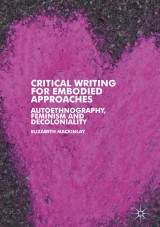Details

Critical Writing for Embodied Approaches
Autoethnography, Feminism and Decoloniality|
CHF 106.50 |
|
| Verlag: | Palgrave Macmillan |
| Format: | |
| Veröffentl.: | 21.02.2019 |
| ISBN/EAN: | 9783030046699 |
| Sprache: | englisch |
Dieses eBook enthält ein Wasserzeichen.
Beschreibungen
<p>Autoethnography is a unique discipline which steps inside and outside the self to experience, embody and express social and cultural meaning. At once a performative, political and poetic genre of research writing, it holds the potential to uncover the ‘heart of the world’, if only for a moment. The author uses theory as story and story as theory to explore her place in the world through painstaking and intimate self and social narratives to lay bare the unique challenges and rewards of autoethnography. </p><p>Framed around the metaphor of ‘heartlines’, the author explores autoethnographic practice as critical feminist and decolonial work and the power it holds for not only imagining a wise, ethical and loving world, but for making such a kind place possible. Through a performative journey of the heart, we travel with the author as she unearths the power of words, of writing and not-writing, evoking in particular the work of Hélène Cixous and Virginia Woolf. This reflective, passionate and pioneering volume will be of interest and value to all those interested in autoethnography and the ways in which it can be applied as critical, ethical and political work in the social sciences. <br></p><div><br></div>
1. A-Way of Writing, the Way it is Written.- 2. Ending Writing, at the Beginning.- 3. Writing with Cixous, in Love.- 4. Writing with Virginia Woolf, not Afraid.- 5. But First, a Love Affair with Words.- 6. Writing, in and to Arrivance.- 7. Writing, A-Way to Un-Forgetting.- 8. Writing Decoloniality, with Cixous and Woolf.- 9. Critical Autoethnography, to Trouble with Words.- 10. Writing, an Ethical Conversation.- 11. Beginning Writing at the Ending; a Second Take, a Second to Take
<b>Elizabeth Mackinlay</b> is Associate Professor in the School of Education at the University of Queensland, Australia.
Explores the uses of autoethnography as an influential and radical tool in qualitative educational research and writing Argues that autoethnography enables an emotioned, embodied and ethical approach to issues of research and writing in education Uses autoethnography to critically examine the potential of autoethnography in education research
Diese Produkte könnten Sie auch interessieren:

Community Schools in Africa

von: Deborah Glassman, Chloe O'Gara, Kristin Helmore, Jordan Naidoo, Fred Wood

CHF 59.00















